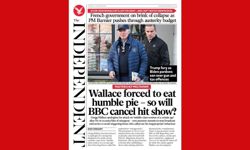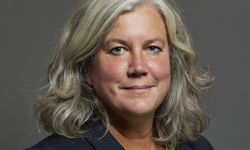One of the most important developments at the Society of Editors conference in Southampton was something that Culture Secretary Sajid Javid didn’t say.
In a long and carefully scripted keynote speech, Javid failed to mention a royal charter for the press, or to suggest that IPSO, the independent press standards organisation, should be overseen by such a charter.
Indeed there was no mention at all of IPSO by name. Instead, amid paeans of praise for the importance of press freedom throughout the ages, there was merely an insistence that “unethical or inaccurate reporting should be policed not by the state but by an industry-led regulatory system” - something that sounded remarkably like IPSO.
The culture secretary even came close to burying the royal charter plan when he added that there must be no opportunity for politicians “present or future” to interfere with legitimate journalistic practice.
There was also a backward glance at his boss David Cameron’s House of Commons pledge that to do otherwise would cross the Rubicon, even though it has seemed in subsequent months that the prime minister has found himself stuck in the middle of the legendary Roman muddy brook.
Editors were positively itching to finally nail the story of the missing royal charter but, alas, Javid who knew what would have been question number one, felt unable to take any questions and left immediately after his speech.
He did however manage to create a strong sense that the coalition government is not looking for confrontation with the press, at least this side of the rapidly approaching general election.
Misuse of RIPA
Javid also appeared to offer the prospect of action on one of the most pressing legal issues facing journalists – the misuse by the police of the Regulation of Investigatory Powers Act – RIPA - to get their hands on the phone records of journalists in order to identify sources such as leakers and whistle-blowers.
Javid said he agreed with Tony Blair’s mentor Lord Falconer that RIPA, mainly used in cases of terrorism and serious crime, was being deployed by police to target journalists in a manner never intended by legislators.
The culture secretary acknowledged that the right to keep sources anonymous was “the bedrock of investigative journalism” and that the legislation should never be used to spy on reporters and whistle-blowers going about what he called their lawful, vital business.
“I know Teresa May is doing what she can to stop this happening. As secretary of state responsible for the media, I’ll be making sure the Home Office knows just how important this issue is for the industry. And I’ll be watching closely to ensure this act is not misused in future,” Javid insisted.
So far so good, but alert editors noticed the words fell a long way short of a pledge to end the power of police officers with the rank of superintendent or above to authorise such action against journalists.
Earlier, Bob Satchwell, chief executive of the Society of Editors, noted that the Labour government at the time had been warned that the RIPA Bill had been inadequately drafted and was ripe for misuse and had now turned into a modern equivalent of a Dangerous Dogs Act.
Parliament not doing enough
In an after dinner speech at the conference, Gavin Millar QC, who has represented, successfully, a number of journalists who have been prosecuted using RIPA, contrasted the apparent enthusiasm of many parliamentarians for legislation for press regulation with their marked reluctance to protect press rights and due process.
“Parliament should have written the right to protect confidential sources into RIPA - along with explicit procedural safeguards for this important right,” insisted Millar.
The distinguished lawyer added: “These should make clear that when investigating authorities want to use covert powers to identify sources, they must go before a judge with a full account of the issues in the case.”
All the warnings seemed to be of little avail in the end. In December, the home secretary announced proposals for new codes of practice under RIPA and the Acquisition and Disclosure of Communications Data Code of Practice.
Under the proposals, a senior police officer – rather than a judge – will still be able to authorise interception of communication records of journalists. In fact, as well as journalists, the phone records of lawyers, medical doctors, religious ministers and even MPs would not be privileged.
The only real change is that the senior police officer “must give special consideration to necessity and proportionality” if such groups, including journalists, are to be targeted.
The code would also require police to make a note of the fact that a journalist’s phone records had been accessed.
The Society of Editors unsurprisingly said the proposed amendments to the code went nowhere near meeting concerns.
“The police don’t get it and now it seems ministers are missing the point. They are more concerned with who might talk to the media than whether or not the public have a right to know what is being hidden,” the Society said.
Deteriorating police relations
During the Southampton conference, there was further evidence of the deteriorating relationship between the press and many police forces in the wake of the Leveson Report.
Nigel Pickover, editor of the Eastern Daily Press, said police in his area regularly lied to his journalists and treated the press as if they were the enemy. The Nottingham Post editor Mike Sassi explained his paper now had no relationship at all with the Nottinghamshire force.
There was therefore considerable scepticism when Colette Paul, the chief constable of Bedfordshire told the conference that the police and press needed good, strong robust relationships.
“We need to show the public what we do and how we do it,” she claimed.
In his keynote speech, Sajid Javid appeared to offer further comfort for the British press with an attack on “the right to be forgotten” ruling of “unelected Luxembourg judges”.
The culture secretary called the so-called “right”, censorship by the back door and said that while stories were not actually being deleted if they could not be found by search engines, they might as well have been.
Google was now receiving a request every 90 seconds on average to have names deleted from their electronic record, about 45 per cent of which are accepted.
Javid did promise that if the Conservatives received a majority at the next general election, the new government would scrap “Labour’s Human Rights Act” and deliver a new British Bill of Rights and Responsibilities.
“I’m delighted to announce that I have agreed with the justice secretary that the British Bill of Rights will include specific protection for journalists and a free press.”
Sir Alan Moses
The culture secretary may have not mentioned IPSO by name but most of the delegates in Southampton would have had their first encounter with the organisation’s founding chairman, the quirky former judge, Sir Alan Moses.
Sir Alan told them that one of the few things he has learned in nineteen years as a judge was that it was better to answer your opponent’s arguments rather than kicking his shins.
“The best weapon is always reason and not the boot,” said Sir Alan who declared himself an opponent of pointless audits and meaningless targets.
Whatever IPSO decided, someone was going to be disappointed and disagree with its decisions.
“IPSO’s ability to be a genuine regulator will not depend so much on the nature of its conclusions: breach or no breach, but on the processes and procedures by which they are reached,” Sir Alan explained.
On issues such as what constitutes the public interest, which allows many reasonable but contradictory conclusions, there will often be no “right” answer.
“IPSO will give, on such occasions, the answer by which you have agreed to be bound,” Sir Alan promised.
For the IPSO chairman, the truly remarkable thing, a source of pride and wonder, was that such a diverse range of publications had agreed to be bound by short and powerful standards and to be bound, legally, by the regulator’s decisions.
IPSO, Sir Alan promised, would come armed with a slim, clear book of rules and not with an iron fist.
BBC and the regional press
At the conference, the BBC offered a modest olive branch in its long running confrontation with the regional press, which has long complained that the corporation lifts its stories without compensation and often without acknowledgment.
James Harding, former editor of The Times and director of BBC News said the BBC was up for “more partnerships, more openness, more trying things out”.
There had been discussion of the creation of a fund to ensure that courts were covered in a more comprehensive way and whether licence fee money could be used for such a purpose.
There were differing views, though, within the BBC, Harding said, on whether the BBC should pay for more local content. A second pilot scheme in the North East, following one in West Yorkshire had been approved, to syndicate BBC content including sport to all local news providers.
But Harding insisted that BBC News acted as a megaphone for all independent journalism in the public interest.
“A Britain without the BBC will lose that platform for your work. It will not mean more news, it will mean more PR,” said Harding.
“The BBC reinforces the role of newspapers,” the BBC news director added.
There was a note of hope for the future in the digital age from Larry Kramer, president and publisher of USA Today, who told how the newsroom had been “digitised in every possible way”. As a result, there were now around twenty editions of the paper a day on all possible devices with most of the growth coming from social media.
Kramer also explained what could be achieved when the editorial resources of a large group like Gannett are harnessed.
A stripped down version of USA Today was now being carried by a range of Gannett local papers providing the sort of travel, books and arts coverage the local paper could no longer do.
“It has been a massive home run for us,” Kramer explained.












